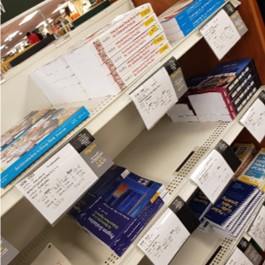
“My freshman year, I spent $700 on textbooks at the [FAMU] bookstore,” a student, who asked that their name not be used, said. “Since then, I haven’t purchased a textbook. I’ll either rent them or find them online somewhere.”
Textbook affordability has long been an issue for students. Jalen Williams, a fourth-year student from Detroit, shared a similar experience.
“My first year, I [bought textbooks from the bookstore] but then afterward, I started renting from other online sources because it just became [too expensive],” Williams said. “Even renting [books] on campus is more expensive than doing it online.”
Another student who also asked to not be named shared a similar observation. “Textbooks in the [FAMU] bookstore are way too expensive. I don’t buy textbooks there at all.”
Online retailers such as Amazon and Chegg provide students with more flexible pricing and medium options. These retailers often provide electronic versions of books that are not only cheaper but give students the same material without the physical bulk of traditional textbooks.
Despite electronic textbooks being offered in the FAMU Bookstore, online retailers often offer cheaper prices for these books.
For example, a textbook for business law is available for rent from the FAMU Bookstore for $98, but Amazon provides an electronic version of the textbook to rent for $36 and to purchase from $41. McGraw-Hill, the publisher of the textbook, offers e-book rentals of the same textbook from $54.99 and rentals of the physical textbook at $70.
Compared to the FAMU Bookstore, the aforementioned online alternatives offer the same textbook for up for 62 percent off.
Despite the high prices in the FAMU Bookstore, FAMU has implemented a Book Voucher Program that, according to the FAMU Student Accounts website, “allows students to add value to their Rattler ID card to purchase books at the FAMU Book Store (only) prior to the first day of class.”
However, to be eligible, students must receive financial aid and “the student’s financial aid awards must exceed university charges due.”
This means that the eligibility and the amount given for the book voucher program depends on how much financial aid a student receives. The promise of having textbooks in a timely manner led Williams to support the waiver.
“I feel like it would make our workload easier. You know, sometimes when you’re waiting for your books to come in, you miss assignments or readings because you don’t have [a book]. So, I feel like if they had a book waiver until our books came in, you would stay on track.”
When asked what improvements could be made at the FAMU Bookstore besides textbook pricing, Williams had none. “Customer service is great. If they could just lower the prices, they would be A-1,” he said.
Marlene Barnett, a senior from Fort Lauderdale, believes that the FAMU Bookstore could provide more financing options.
“I think it would be cool if they gave incentives. Probably like gift cards to shop there, or if they had a point system,” she said.
Regardless, textbook affordability has a great impact on students because of the financial inability or hardship that students face in obtaining the necessary materials for academic success.
The FAMU Bookstore does offer price matching with Amazon, bn.com and local competitors. For more information about the price match requirements visit famu.bncollege.com.